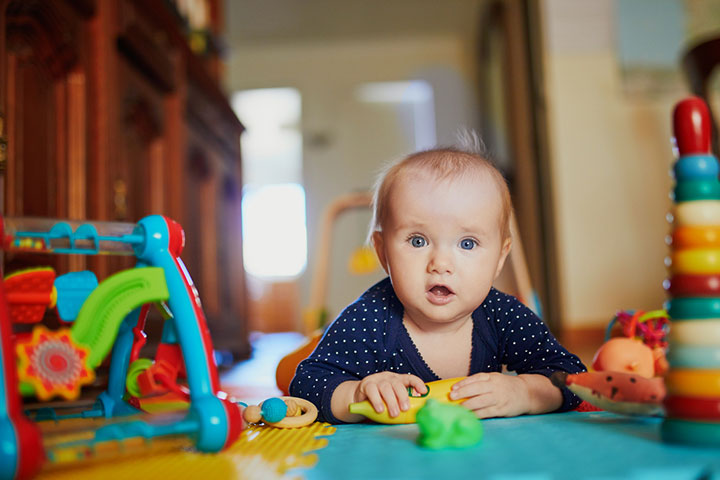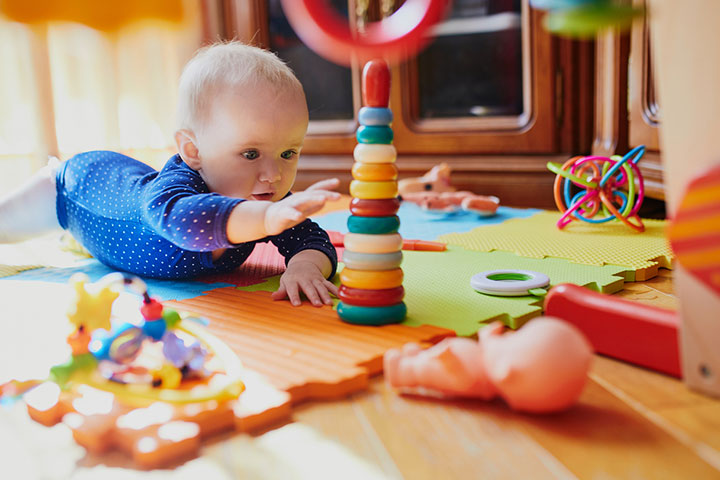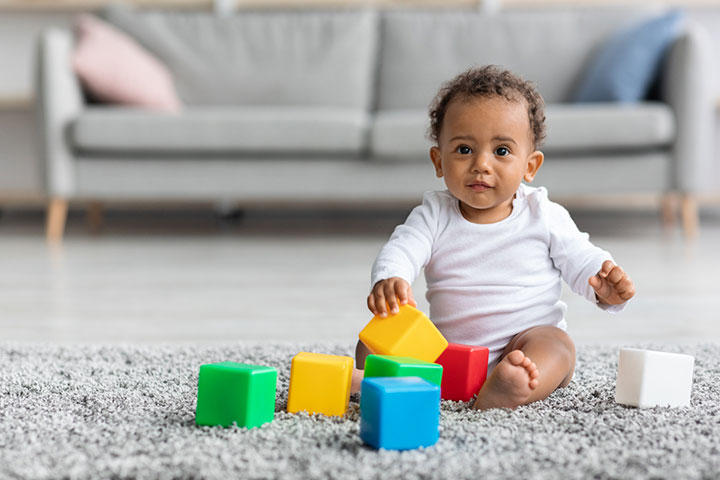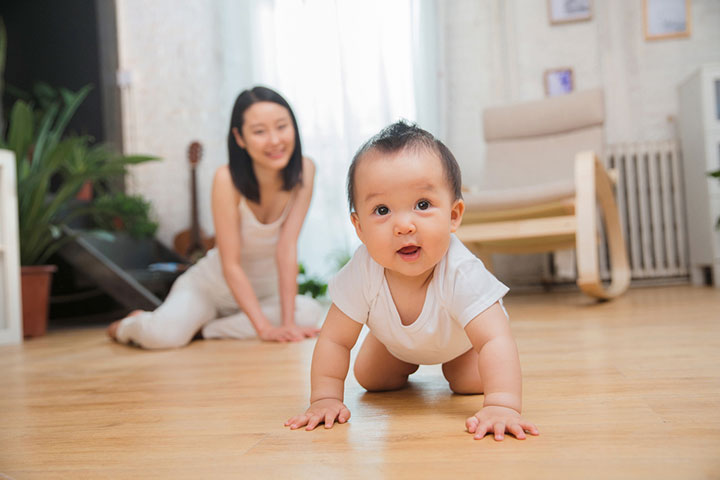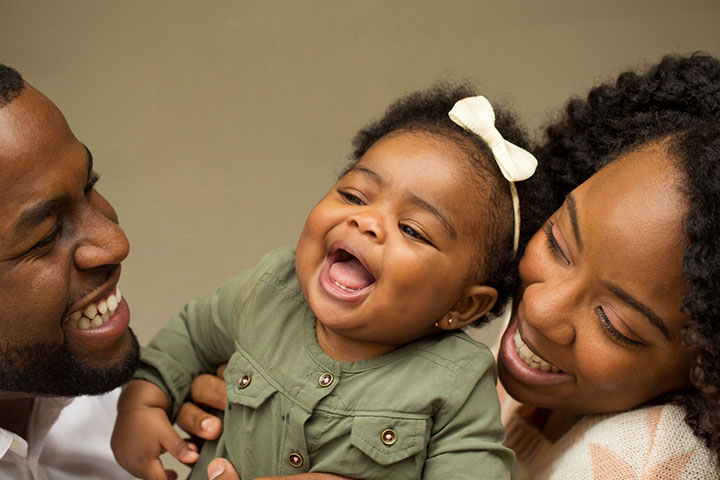Nothing makes you happier than seeing your baby reach the developmental milestones healthily. If you look at your 8-month-old’s development, you’ll see that your baby has become more active. They are fascinated by everything and often crawl to explore the house. Even if they address the incorrect parents, they may say “mama” and “dada,” bringing a smile across your face each time they say it.
Parents must be aware of their child’s developmental milestones at any age. Read this post to get insights into your baby’s developmental benchmarks at eight months of age and some advice on how to improve their abilities.
8-Month-Old’s Development Chart
| Achieved Developmental Milestones | Emerging Developmental Milestones |
|---|---|
| Supports weight on both legs when upright | Stands holding support |
| Tracks moving objects | Tries to follow and catch moving objects |
| Manipulates objects by passing them between hands | Develops finer control of fingers for complex movements |
| Speaks words of simple syllables such as ‘M’, ‘D’, and ‘B’ | Improves on the range of spoken syllables |
| Understands basic repetitive instructions | Can understand wider range of unique instructions |
| Says “mama” and “dada” to any parent | Uses the correct noun for each parent |
| Develops pincer grasp | Can use the entire hand to grab objects |
| Displays separation anxiety | Becomes more enduring about separation |
| Gets into crawling position quite easily | Attempts getting into standing position on his own |
| Understands the purpose of personal objects | Remembers the purpose of other objects in the house |
8-Month-Old’s Developmental Milestones
Your baby is going to achieve her developmental milestones in three primary growth categories – cognitive, physical, and socialandemotional skills.
Cognitive Developmental Milestones
These milestones pertain to the baby’s brain development, intelligence, and the ability to comprehend the world around her.
- Speech and language skills: As mentioned above, comprehension of language is also improving at this stage, and she is now able to speak some basic syllables and babbles using long and short sounds (1). She will have a decent object-noun association and recognize the names of basic things such as ‘milk,’ ‘toys’, and the names of siblings and friends. Your baby’s babbling will become more complex, and they may start to use gestures to communicate their needs and wants.
- Always curious: She will become more mobile and curious and show a strong interest in exploration. She is like a detective, investigating everything from household items to new toys. She loves grabbing objects in her little hands and probing them to understand their function although she is too young to decipher them correctly. Despite the surge in inquisitiveness, the attention span is short (of two to three minutes) and once through with activity, she looks for something new to explore (2).
- Understands basic instructions: Your baby will learn to interpret a few instructions that you use repeatedly, remembering from what they sound like. For example, when you say “Come here, dear,” she will eagerly crawl towards you, and when you say “No!” she gives you a look that denotes she understands what you said, and obeys too (3)!
- Tracks path of objects: Drop a feather and notice how the baby watches it sway and fall. By this age, infants develop sufficient capabilities to predict the path of falling or moving objects.
- Points at objects with index finger: Your little one will now point at objects that she wants or finds interesting (4). This indicates that she understands that pointing a finger means showing an object.
- Tests cause and effect: Your home gets noisier when your baby learns to examine cause and effect by hitting objects. Infants also love getting reactions from their caregivers. So, do not be surprised if she tips her bottle down just to see your response.
- Will relate objects with their purpose: A bottle indicates food, a toy denotes fun, and when swaddled in a soft blanket she will fall asleep. At eight months, your baby begins to understand the significance of objects, especially everyday personal items.
Physical Developmental Milestones
These milestones pertain to the development of the baby’s gross motor skills, muscular dexterity, and physical strength.
- Sits without support: Gets into a sitting position effortlessly, without support, and without that shakiness she had a few months ago (5). She will stretch her arm out to reach an object while sitting – a remarkable indicator of the developed strength and prowess of her lower back muscles.
- Will turn towards a sound: Shake a rattle, and she will turn towards the source of the sound. This is because an eight-month-old develops a decent coordination between her senses and motor skills.
- Develops pincer grasp: Pincer grasp is the ability to grasp an object using the first two fingers and the thumb. The baby will pick dropped items and manipulate them with the capability to grasp and release at will. The increase in the strength of arm muscles and ligaments makes this possible.
- Can feed pieces of food: If she can pinch and pick objects, then she can certainly do the same with bits of food. Serve her pieces of her favorite fruit, and she will help herself to it. Mother of two Hayley Emma from the UK, shows her eight-month-old son Reuben’s typical meal choices in one of her videos. She narrates, “At about 12 o’clock I make him one of his favorite, scrambled eggs on toast with baked beans and a little bit of spinach. We decided to stir a mixture of baby-led weaning and puree, so he has a mix of finger food and spoon feeding, the same as what we did with my toddler when he was weaning. I’m also going to give him a couple of raspberries for his pudding, and these are really good finger food for weaning babies because they’re soft, and he finds them quite easy to chew (i)
- Makes attempts to chew: You will notice her jaws move every time she takes food in. Those are her first attempts at chewing, which means she is developing the muscle reflexes necessary to mince food in the mouth (5).
- Passes objects from one hand to another: Your little one has done this earlier, but now does it with precision, without dropping the object. Coordinated gross motor skills help her achieve this developmental milestone.
- Bears weight on legs when held upright: When you hold your baby vertical/upright, she will support her weight on both legs. She cannot stand by herself yet and needs your support.
- Rolls in both directions: The little one can roll in either direction, which means she can go 180 degrees when placed on her back or tummy (6).
- Can crawl: Babies learn to crawl between seven and ten months and some babies master it by the end of the eighth month itself. Your baby could be shuffling on her stomach and slowly pushing the arms down to crawl.
- Vision develops depth perception: An eight-month-old can judge the distance between two objects and their distance from her thanks to the ability of the eyes to perceive depth and distance. By the eighth month, babies develop coordination between their vision and limb muscles (7). This means they can see and judge where they are crawling to and when they need to move away from an obstacle.
- Sleeps longer at night: By the eighth month, infants sleep in blocks of ten to 11 hours in the night and have three to four hours of sleep during the daytime (8).
Social and Emotional Developmental Milestones
Your baby also develops socially and emotionally. These milestones are about her social interactions, emotional temperament, and behavior towards people around her.
- Displays separation anxiety:Your little one will get anxious and wail if you leave her alone, especially with a stranger, as babies are heavily reliant on you to feel a sense of security. If she is alone, like in the crib, she will violently move her hands and legs looking in the direction you left.
- Will feel shy or uncomfortable around strangers: She may not like strangers, even when you are around. When you introduce her to a new face, she may stare at that person for some time, then hide her face in your arms, or not react at all. Some babies may smile at strangers if coaxed by the parent or if the stranger pulls a funny trick. But, for the most part, she would prefer maintaining her distance.
- A smile is how she greets: They will develop the recognition skills for familiar faces and voices and will respond with excitement. She will smile and chortle at a parent who just returned from work or grandparents who have just arrived. She understands the permanence of certain individuals.
- Shows signs of empathy: When she sees another infant cry, she may also whimper and make a sad face, often looking at her parent. Your baby just showed the emotion of empathy towards someone in distress.
Every baby is unique and may achieve their developmental milestones at an individual pace. Do not fret if your little one misses any milestones since she will eventually attain them a few months later. However, you must assess your baby to make sure all is okay.
When To Be Concerned?
Developmental delays can sometimes be identified during this stage, and early intervention can be key to addressing any issues. Here are the scenarios that indicate a severe delay in the healthy development of your baby:
- Doesn’t sit even with help: If you baby doesn’t sit on her own, even if you prop her up and she only topples, then there is a problem. You also notice flaws in her posture. These could be the indicators of neuromuscular disorder.
- Has stiff muscles: When you place the baby upright on the feet, her legs should naturally push the ground. But if the legs and arms curl up tight, then it is a point to be concerned.
- Makes no noises or sounds: The infant is abnormally quiet, and you seldom hear her make any noises like other babies of her age. They may not speak multiple words but make simple sounds to experiment with their vocal chords. If that is not the case with your baby, then it could be a serious developmental delay.
- Does not recognize familiar people: Trouble recognizing familiar faces, including primary caregivers, could indicate a neurological disorder. Such babies are often socially detached and seem inward. Take the baby to a pediatrician for a check-up.
- Has a poor gaze: Your baby seems lost every time she looks around and has trouble looking at the source of the sound. She is unable to track even slow-moving objects, often looking confused as if the object has just disappeared.
These are the red flags in your baby’s development that you need to be watchful.
Also, did you know that you can support your baby to work on her milestones?
5 Tips To Improve The Development Of Your 8-Month-Old
A baby can reach her developmental milestones better when she is stimulated by conducive activities and environment around her. Here are some ways you can help her grow better:
- Have interactive playing sessions: Talk to your baby as much as you can when you play with her. It not just gets her involved in the activity but also stimulates her senses and cognitive abilities to process verbal information.
- Refer individuals and objects by their name: Give every toy a name and call it by that name. Introduce your baby to people by their name or relation. Associating individuals and objects with a name improves object-noun association, and although your baby is too young to remember the name, she will remember the sound of it.
- Have story reading sessions: Babies love bright colors. Brightly illustrated baby books are perfect for a reading session. Make her sit on your lap while you read through the entire book. It stimulates her vision and improves the ability to discern colors.
- Meet new people: Meeting new people is good for the baby since it will hone social skills and even stimulate her memory. It will also ease the anxiety of meeting strangers.
- Play games that get the baby to crawl: While having tummy time is good, you should also introduce games that involve crawling. Crawling is an important activity to strengthen muscles and make them ready for future walking.
You would be excited about your eight-month-old’s development as they have achieved several physical, cognitive, and social milestones. At this age, they will be able to sit without support, eat small pieces of food, understand instructions, have separation anxiety, and smile to greet people. Since your baby will also be more mobile, you have to be extra cautious so that they do not do or ingest something dangerous. You can help improve your children’s development through play and story sessions. However, if your baby does not sit without help, make sounds, or recognize familiar people, it is better to consult a doctor as it might indicate developmental issues.
Key Pointers
- At 8 months, babies reach cognitive, physical, and social-emotional milestones.
- Cognitive skills include object-noun association, basic instructions, and tracking moving objects.
- Physical milestones are sitting unsupported, pincer grasp, and turning to sounds.
- Social-emotional milestones are separation anxiety, object permanence, and using correct nouns for parents.
- Parents can enhance development by providing varied experiences, using simple language, and encouraging physical activity.
Marvel at the awe-inspiring progress and advancement of your baby throughout the 8-10 month period. Uncover priceless advice from Eastern Idaho Regional Medical Center on nurturing your precious child towards accomplishing their developmental milestones.

